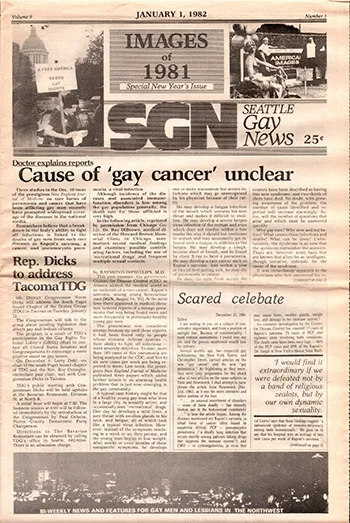Dive into the archives of the SGN at https://issuu.com/sgn.org

SEATTLE GAY NEWS
VOLUME 9, ISSUE 1
JANUARY 1, 1982
Three studies in the Dec. 10 issue of the prestigious New England Journal of Medicine on rare forms of pneumonia and cancer that have been afflicting gay men recently have prompted widespread coverage of the diseases in the national media.
Researchers believe that a breakdown in the body's ability to fight off infections is linked to the deaths of gay men from such rare diseases as Kaposi's sarcoma, a cancer, and pneumocystis pneumonia, a viral infection. Although incidence of the diseases and associated immunefunction disorders is low among the gay population generally, the death rate for those afflicted is very high.
In the following article, reprinted by permission from Chicago Gay Life, Dr. Ray DiBrown [sic], medical director of the Howard Brown Memorial Clinic in Chicago, summarizes recent medical findings and examines possible contributing factors, including the use of 'recreational drugs' and frequent multiple sexual contacts.
by Raymond DiPhillips, M.D.
This past summer, the government Centers for Disease Control (CDC) in Atlanta alerted the medical world to an outbreak of a rare cancer, Kaposi's sarcoma, among young homosexual men [SGN, August 14, '81]. At the same time there appeared in medical literature isolated reports of a strange pneumonia that was being found more and more frequently in previously healthy young gay men.
The pneumonia was considered strange because up until those reports, it had been found only in people whose immune defense systems – their ability to fight off infections – were severely defective. To date, more than 160 cases of this pneumonia are being analyzed at the CDC, and five to six new cases per week are being reported to them. Last week, the prestigious New England Journal of Medicine published three papers which added further details to an alarming health problem that is just now emerging in the gay community.
A typical case history might be that of a healthy young gay man who lives in a large city, is sexually active, and occasionally uses "recreational" drugs. One day he develops a mild fever, a sore throat with swollen glands in his neck, and fatigue, all of which look like a typical virus infection. However, instead of the symptoms resolving in a week or so, they persist, and the young man begins to lose weight. After weeks or even months of these nonspecific symptoms, he develops one or more uncommon but severe infections which may go unrecognized by his physician because of their rarity.
He may develop a fungus infection of the mouth which worsens his sore throat and makes it difficult to swallow. He may develop a severe herpes virus infection of the rectum and anus which does not resolve within a few weeks the way it should but continues to worsen and may secondarily get infected with a fungus in addition to the herpes. He may develop a cough, become short of breath, and be found by chest X-ray to have a pneumonia. He may develop a rare cancer such as Kaposi's sarcoma. And within a year or two of first getting sick, he may die of pneumonia or cancer.
To date, 23 men from across the country have been described as having this new syndrome, and two-thirds of them have died. No doubt, with growing awareness of the problem, the number of cases identified and reported will increase alarmingly. So, too, will the number of questions that arise and which must be answered quickly. Why gay men? Why now and not before? What causes these infections and deaths? What can be done? Unfortunately, the syndrome is so new that the questions outnumber the answers. ...
... Given the present state of ignorance, no firm health recommendations can be given. Certainly any gay man who after weeks or months has not recovered from a viral illness should see a doctor, preferably one acquainted with and knowledgeable about gay health issues. It must be stressed, too, that even though recent reports of fatal infections and cancer in the gay community are disturbing, they still remain uncommon. We can hope that further definition of the exact cause or causes of such lethal complications in gay men will be forthcoming.
This article was edited for length. To view the original article in full, visit https://issuu.com/sgn.org/docs/sgn_january_1_1982

